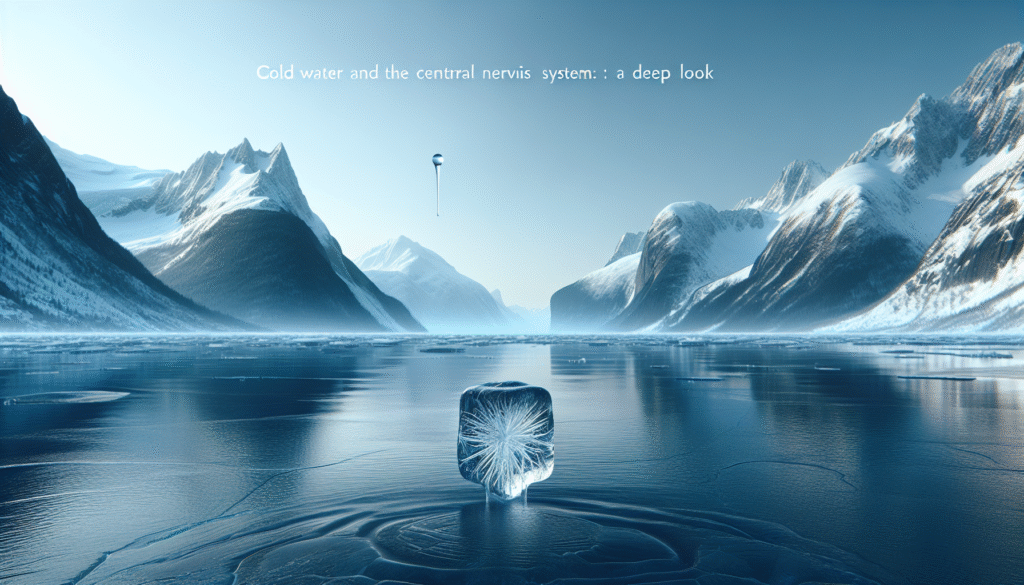Have you ever wondered how cold water affects your body, particularly your central nervous system? It’s a fascinating connection that goes beyond just the immediate shock of that icy temperature. You might even be surprised to find out that immersing yourself in cold water has a range of impacts, from biological to psychological. Let’s take a deep look at the relationship between cold water and your central nervous system.

Understanding the Central Nervous System
Your central nervous system (CNS) is crucial to your existence. It consists of your brain and spinal cord, working in tandem to relay messages throughout your body. This system controls everything from basic reflexes to complex thoughts and emotions. To appreciate how cold water interacts with the CNS, you first need a foundational understanding of its structure and function.
Structure and Function of the CNS
The CNS is structurally complex, but you can break it down into key components:
-
Brain: The control center of your body, it processes information and determines your body’s responses.
-
Spinal Cord: This is the communication highway between the brain and the rest of the body, relaying sensory and motor signals.
The CNS is also responsible for higher cognitive functions—including thinking, memory, and emotional responses. Any disruption in this delicate system can have significant impacts on your well-being.
The Physiology of Cold Water Exposure
Getting into cold water causes a brisk, physiological reaction. Your body perceives the drop in temperature as a stressor, leading to immediate involuntary responses. Understanding these responses can shed light on how your CNS deals with cold exposure.
Cold Shock Response
When you first enter cold water, your body triggers what’s known as the cold shock response. This encompasses several changes:
- Increased Heart Rate: Your heart beats faster, pumping more blood to vital organs.
- Hyperventilation: You may start to breathe more rapidly, which can lead to lightheadedness.
- Vasoconstriction: Blood vessels constrict to preserve heat, redirecting blood flow to essential areas.
These physiological changes are your body’s way of coping with sudden temperature fluctuations and protecting itself from potential harm.
Stress Response and Hormonal Changes
Exposure to cold water can activate your stress response system. When you’re hit with that icy water, your body releases stress hormones like adrenaline and cortisol. Here’s what this means for your CNS:
- Heightened Alertness: Your brain becomes more alert, gearing you up for any threat the cold may represent.
- Improved Focus: The rush of hormones can sharpen your focus and increase your sense of awareness.
While this can be a beneficial response in the short term, you should also be aware of how consistent cold exposure can impact your CNS over time.

Long-Term Effects of Cold Water Exposure on the CNS
Cold water isn’t just a quick shock; repeated exposure can have profound long-term effects on your body and mental health. Let’s take a look at some of those effects and the science behind them.
Desensitization to Cold
Over time, regular cold exposure can lead to desensitization. Your body becomes accustomed to the cold and responds less dramatically. Here’s how this affects your nervous system:
- Decreased Cold Shock Response: Over time, your heart rate and breathing may not increase as dramatically during cold exposure.
- Improved Thermoregulation: Your body learns to manage its temperature more effectively, reducing stress on the CNS.
This desensitization can be beneficial, especially for swimmers, divers, or those who regularly engage in cold-water activities.
Mood Regulation and Mental Health Benefits
One of the significant benefits of cold water exposure is its impact on your mental health. Research has shown that cold water can elevate mood and reduce anxiety levels. Here’s how it works:
- Endorphin Release: Cold exposure can trigger the release of endorphins, your body’s “feel-good” hormones.
- Increased Resilience: Regular cold exposure can help improve resilience against stress, giving you better control over your emotions.
This connection between cold water and mental health could be a game-changer for anyone looking to improve their overall well-being.
Impact on Sleep Quality
Interestingly, exposure to cold water may also impact your sleep quality, which has downstream effects on your central nervous system. Here’s what to consider:
- Regulation of Sleep Hormones: Cold exposure can help regulate melatonin levels, improving your ability to fall asleep.
- Deep Sleep Benefits: Experiencing cold can be refreshing and may lead to longer periods of deep sleep.
Quality sleep is vital for your CNS function, as it plays a critical role in memory consolidation and emotional regulation.

The Science Behind Cold Water Adaptation
If you’re intrigued by the benefits of cold water exposure, you may wonder how you can safely incorporate it into your routine. Understanding the science behind cold water adaptation can help you navigate this process.
Cold Water Swimming and Immersion
Swimming in cold water is one of the most common forms of exposure. While it might seem daunting, gradually easing into it could yield benefits. Here’s how to approach it:
- Start Slow: Begin with brief exposure to cold water and gradually increase your time.
- Regular Practice: The more you engage with cold water, the better your body adapts.
Protocols for Cold Exposure
If you’re serious about benefiting from cold exposure, consider these protocols:
| Cold Exposure Method | Duration | Frequency | Notes |
|---|---|---|---|
| Cold Showers | 30 seconds | Daily | Start with a warm shower and gradually decrease the temperature. |
| Ice Baths | 10-15 minutes | 1-3 times per week | Ensure you have someone with you for safety. |
| Cold Water Swimming | 10-30 minutes | 2-3 times per week | Choose water that you feel comfortable with, and always prioritize safety. |
Listening to your body is paramount. If you ever feel overwhelmed or in distress, it’s essential to get out of the water and warm up.

Safety Considerations When Exposed to Cold Water
While there are numerous benefits to cold water exposure, there are also risks involved. Your safety should always come first when engaging in cold water activities.
Recognizing Hypothermia
Hypothermia is a severe condition that can result from prolonged exposure to cold water. Here are the signs to watch out for:
- Shivering: Your body’s first response, but if shivering stops, it’s a warning sign.
- Confusion: Difficulty thinking clearly, known as “cold-water shock.”
- Fatigue: Unusual tiredness, which can be dangerous in cold water.
If you notice signs of hypothermia in yourself or others, it’s crucial to exit the water and seek warmth immediately.
Engaging in Cold Water Safely
Here are some tips to ensure that you’re practicing cold exposure safely:
- Have a Buddy: Whenever possible, engage in cold water activities with someone else. Safety in numbers is always a good policy.
- Know Your Limits: If you’re new to cold water immersion, don’t push yourself too hard, too fast.
- Warm Up Gradually: After exposure, warm up your body slowly. Rapid warming can shock your body, leading to complications.
It’s always best to consult with a healthcare provider before embarking on a cold water journey, especially if you have pre-existing conditions.

Conclusion: The Journey of Cold Water and Your CNS
The relationship between cold water exposure and your central nervous system is complex yet fascinating. From the immediate cold shock response to the long-term benefits like improved mood and sleep, cold water offers an intriguing experience for both the body and mind.
Incorporating cold water exposure into your routine can be rewarding but always requires a thoughtful approach. You must respect your body’s limits while also enjoying the invigorating benefits that come with plunging into chilly depths.
By understanding how your CNS interacts with cold water, you’re better equipped to harness its power—both physiologically and mentally. So, when was the last time you dipped your toes in the cold? Maybe it’s time to reconsider your relationship with water—it just might lead to profound changes for your body and mind.

